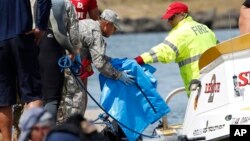Officials announced Monday that they have suspended the search for five Army soldiers who were in a helicopter crash during offshore training in Hawaii last week.
Families of the missing soldiers were notified about the search suspension before reporters were told at a news conference and there has been no determination yet of the crash's cause, said Maj. Gen. Christopher Cavoli, commander of the 25th Infantry Division.
Searchers mounted the best search they could, said Rear Adm. Vincent B. Atkins, commander of the U.S. Coast Guard's 14th District
Two Black Hawk helicopter crews were conducting training off the western tip of Oahu the night of Aug. 15 when one aircrew lost contact with the crew whose helicopter went missing.
Pieces of helicopter found
A multi-agency team searched about 68,000 nautical miles but saw no signs of life or of the crew that went missing. They found what appeared to be pieces of helicopter fuselage and a helmet in a debris field that expanded with strong currents to remote, deep areas of the ocean.
Mario Vittone, a retired Coast Guardsman and expert on sea survival, said the fact that parts of the fuselage were found indicated the helicopter's impact with the ocean was substantial.
“There's not a big record of people surviving impacts with the water when the impact is so significant that the fuselage is torn apart,” he said.
People can last about three days without water as long as they are not working very hard, but in the ocean it is difficult to get rest while trying to survive, Vittone said.
Crew wearing life vests
All five crew members on board had life vests, air bottles for underwater breathing and radios with built-in GPS systems, the Army has said.
“All these things lead you to believe they didn't leave the aircraft, because if they could get out of the aircraft and inflate their floatation devices, then why would they not then turn on their beacons?'' Vittone said.
The ocean floor drops quickly off the coast of Oahu, and is over 1,000 feet (305 meters) deep in parts of the search area.
The Navy brought in remotely operated underwater vehicles and sonar to help in the search.




